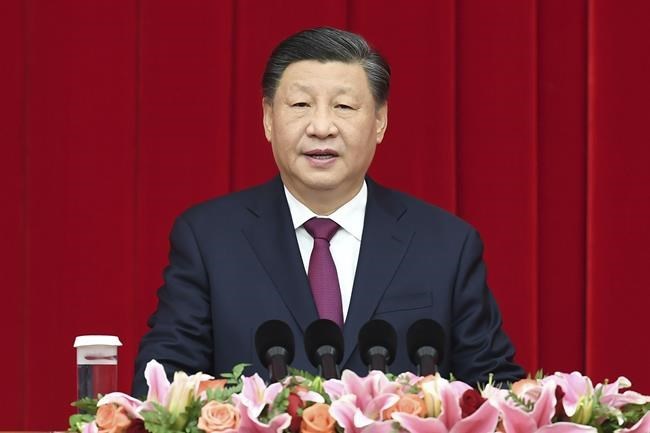BEIJING (AP) — China called for a cease-fire and peace talks between Ukraine and Russia on Friday, and Ukrainian President Volodymyr Zelenskyy cautiously welcomed Beijing’s involvement -- but said the plan’s success would depend on actions not words.
Beijing claims to have a neutral stance in the war that began one year ago, but has also said it has a “no limits friendship” with Russia and has refused to criticize Moscow’s invasion of Ukraine, or even refer to it as an invasion. It has accused the West of provoking the conflict and “fanning the flames” by providing Ukraine with defensive arms.
“China has shown its thoughts. I believe that the fact that China started talking about Ukraine is not bad,” Zelenskyy told a news conference on the first anniversary of the Russian invasion.
“But the question is what follows the words. The question is in the steps and where they will lead to.”
He said there are points in the Chinese proposals that he agrees with, and some he doesn't. But China's involvement could be useful in isolating Russia, he said.: “Our task is to gather everyone to isolate the one.”
Zelenskky said his main goal was making sure China doesn't supply weapons to Russia, he said.
"It is Point No. 1,” he said.
He also said he’d like to meet Chinese President Xi Jinping: “I believe that it will benefit our countries and the security of the world."
Russia’s Foreign Ministry also welcomed China’s peace plan Friday, and said it remains open to political and diplomatic efforts.
The plan released by China’s Foreign Ministry mainly reiterated long-held positions, and analysts said Beijing would be an unlikely broker.
It calls for the “sovereignty, independence and territorial integrity of all countries” to be respected, but does not say what will happen to the territory Russia has occupied since the invasion. It also calls for an end to “unilateral” sanctions on Russia, indirectly criticizes the expansion of the NATO alliance, and condemns threats of nuclear force.
The proposal is “an attempt for public relations on the part of China,” said Li Mingjiang, a professor and international security expert at Singapore’s Nanyang Technological University. “I’m not convinced that this policy is going to improve their credibility in being an honest broker.”
Speaking after China issued the paper, but without referring to it, Zhanna Leshchynska, charge d’affaires at the Ukrainian embassy in Beijing, said her country doesn't want peace at any price.
“We will not agree to anything that keeps Ukrainian territories occupied and puts our people at the aggressor’s mercy,” Leshchynska told a gathering at the EU mission to China marking the anniversary of the invasion.
In Russia, Foreign Ministry spokeswoman Maria Zakharova praised the plan for, among other things, “implying halting the flow of Western weapons" and “acknowledging the territorial realities that have emerged.” That would include Russia's illegal annexation of parts of Ukraine.
Ukraine has said it will not agree to any peace without the return of all its territory.
Leonid Slutsky, a senior Russian lawmaker, said the plan contains moves that would mark “an end of the hegemony of the collective West."
Ukraine's allies expressed skepticism. U.S. National Security Adviser Jake Sullivan said on CNN that his first reaction to the proposal was that “it could stop at point one, which is: Respect the sovereignty of all nations.”
He added: “This war could end tomorrow if Russia stopped attacking Ukraine and withdrew its forces.... This was a war of choice.”
German government spokesman Wolfgang Buchner said the Chinese proposal contained several important points, but was missing a key one: “first and foremost the withdrawal of Russian troops from Ukraine.”
China abstained Thursday when the U.N. General Assembly approved a nonbinding resolution that calls for Russia to end hostilities in Ukraine and withdraw its forces.
The 12-point paper also urges measures to prevent attacks on civilians and civilian facilities, keep nuclear facilities safe, establish humanitarian corridors for civilians and ensure the export of grain. It called for an end to the “Cold War mentality” — China’s standard term for what it regards as U.S. hegemony, and maintenance of alliances such as NATO.
“Dialogue and negotiation are the only viable solution to the Ukraine crisis.” the proposal said. It offered no details on what form talks should take but said “China will continue to play a constructive role in this regard.”
While neither Kyiv nor Moscow might pay much heed to the Chinese proposal, Beijing needed to clarify its stance, said Shi Yinhong, a professor of international relations at Beijing’s Renmin University.
“China feels it necessary to repeat its self-perceived neutrality at this juncture, to save some international inference by not only criticizing NATO but also distinguishing itself from Russia’s behavior,” Shi said.
The proposal comes as U.S.-China relations have hit a historic low over Taiwan, disputes over trade and technology, human rights, and China’s aggressive actions in the South China Sea.
The U.S. recently said China may be preparing to provide Russia with military aid, an allegation that Chinese Foreign Ministry spokesperson Wang Wenbin called “nothing more than slander and smears.”
On Friday he referred to a “massive disinformation in this respect against China.”
Wang was responding to a report in the German magazine Der Spiegel that Russia’s military was negotiating with a small Chinese drone manufacturer for the “components and know-how” to allow the country to manufacture about 100 suicide drones a month.
___
Associated Press reporters Huizhong Wu in Taipei, Taiwan and Geir Moulson in Berlin contributed to this report .
___
Follow AP’s coverage of the war in Ukraine: https://apnews.com/hub/russia-ukraine
The Associated Press



